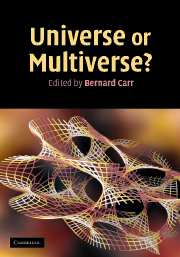Book contents
- Frontmatter
- Contents
- List of contributors
- Preface
- Acknowledgements
- Editorial note
- Part I Overviews
- Part II Cosmology and astrophysics
- 4 Cosmology and the multiverse
- 5 The anthropic principle revisited
- 6 Cosmology from the top down
- 7 The multiverse hierarchy
- 8 The inflationary multiverse
- 9 A model of anthropic reasoning: the dark to ordinary matter ratio
- 10 Anthropic predictions: the case of the cosmological constant
- 11 The definition and classification of universes
- 12 M/string theory and anthropic reasoning
- 13 The anthropic principle, dark energy and the LHC
- Part III Particle physics and quantum theory
- Part IV More general philosophical issues
- Index
- References
5 - The anthropic principle revisited
Published online by Cambridge University Press: 05 July 2014
- Frontmatter
- Contents
- List of contributors
- Preface
- Acknowledgements
- Editorial note
- Part I Overviews
- Part II Cosmology and astrophysics
- 4 Cosmology and the multiverse
- 5 The anthropic principle revisited
- 6 Cosmology from the top down
- 7 The multiverse hierarchy
- 8 The inflationary multiverse
- 9 A model of anthropic reasoning: the dark to ordinary matter ratio
- 10 Anthropic predictions: the case of the cosmological constant
- 11 The definition and classification of universes
- 12 M/string theory and anthropic reasoning
- 13 The anthropic principle, dark energy and the LHC
- Part III Particle physics and quantum theory
- Part IV More general philosophical issues
- Index
- References
Summary
Introduction
My brief historical overview in Chapter 1 alluded to the crucial influence of the Newtonian mechanistic picture on the development of our view of the Universe. According to this, the cosmos operates likes a giant machine, oblivious to whether life or any form of consciousness is present, i.e. the laws of physics and the characteristics of the Universe are independent of whether anybody actually observes them. In the last fifty years, however, the Anthropic Principle has developed [1], and this might be regarded as a reaction to the mechanistic view. This claims that, in some respects, the Universe has to be the way that it is because otherwise it could not produce life and we would not be here speculating about it. Although the term ‘anthropic’ derives from the Greek word for ‘man’, it should be stressed that most of the arguments pertain to life in general.
As a simple example of an anthropic argument, consider the following question: why is the Universe as big as it is? The mechanistic answer is that, at any particular time, the size of the observable Universe is the distance travelled by light since the Big Bang, which is about 1010 light-years. There is no compelling reason the Universe has the size it does; it just happens to be 1010 y old.
Information
- Type
- Chapter
- Information
- Universe or Multiverse? , pp. 77 - 90Publisher: Cambridge University PressPrint publication year: 2007
References
Accessibility standard: Unknown
Why this information is here
This section outlines the accessibility features of this content - including support for screen readers, full keyboard navigation and high-contrast display options. This may not be relevant for you.Accessibility Information
- 6
- Cited by
